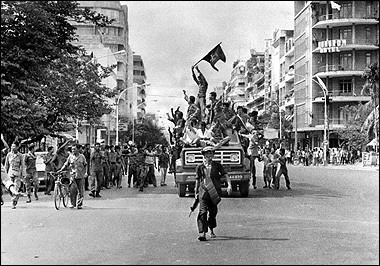Lessons of History: Denial Is Eternal
Thirty years ago today, Khmer Rouge forces entered Phnom Phenh.

And even now, with the mass graves opened, and the bones of the victims there for all to see, some continue to argue that Pol Pot and the Khmer Rouge are not to blame:
[T]o blame the death and destruction caused by foreign invasion and embargo during 1975-79 on Pol Pot’s controversial revolutionary policies is merely reactionary propaganda.

Does the logic sound familiar?
After North Korea signed the armistice, the North Korean people set out to rebuild their devastated nation according to the juche philosophy that promoted self-reliance and national independence. This inspired two New York Times writers in 1972 to note with astonishment that this country, the size of Mississippi, had developed a “well organized and highly industrialized socialist economy, largely self-sufficient, with a disciplined and productive work force.”
Despite their efforts to remain food sovereign, and because of events beyond their control, North Korea could not sustain the stranglehold of the United States. For five decades, the U.S. has pursued military and economic policies that have held 22 million North Koreans hostage and threatened them with nuclear annihilation. These same mad politics are driving the insane military budgets of both nations, diverting vital government resources that would improve the welfare of its people.
Yes, and Hitler had no idea about those exaggerated excesses by a few of his overzealous subordinates. China may need Mr. Liu’s services again when the crimes of its patrons in North Korea and Burma are exposed as well. There is no reasoning a man out of what he was never reasoned into.
That such a fringe view should persist in an allegedly open, democratic society is stunning. We now find ourselves in a state where an elected leader openly roots for the oppressive, aggressive state next door over its long-suffering people:
“I was surprised by questions from eminent scholars and politicians asking me if Korea was preparing for a ‘sudden unification’ situation,” he said. But he said this”would mean one side collapsing, and that does not accord with our unification policy.”
He rated chances of the Stalinist country imploding “very low”. “Korea’s unification process will be fairly different from Germany’s,” he said. “The Korean government has no intention of furthering [such a collapse], and the opposition party does not want North Korea to collapse either.” He added, “Even if some incident were to take place in the North, I think the North has the organizational capacity to maintain internal control.”
And we were surprised by the answer. Even now. If there was an uprising inside North Korea, it’s no longer unthinkable that the South would order its forces to intervene on the side of the North.